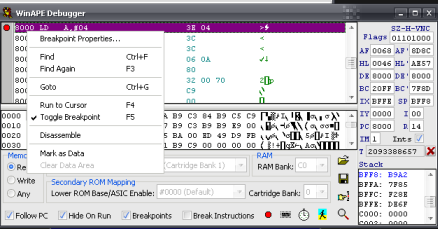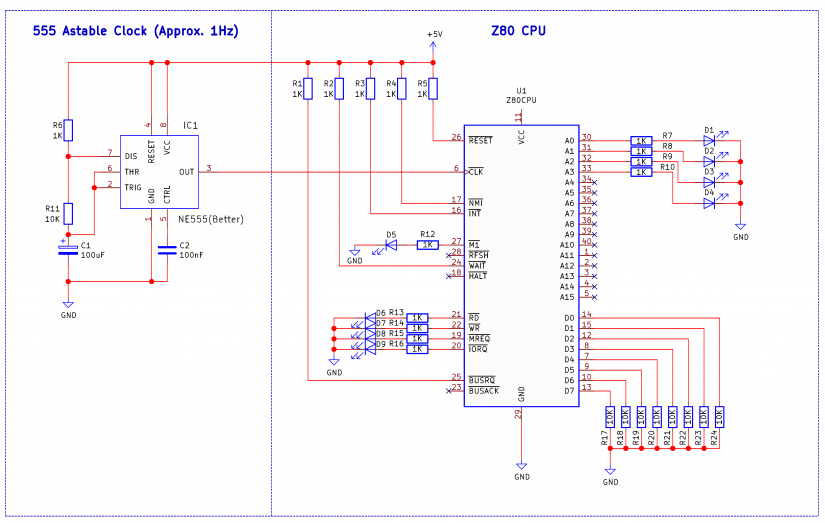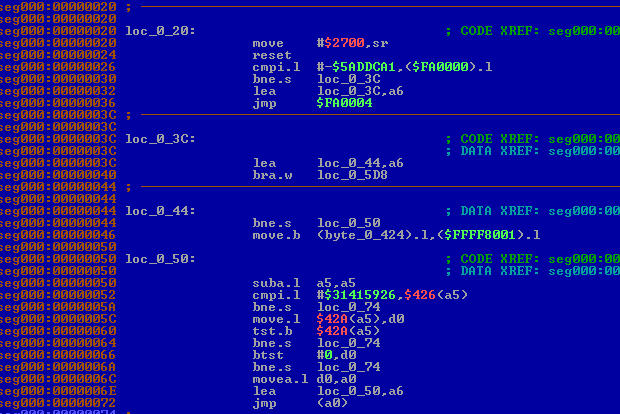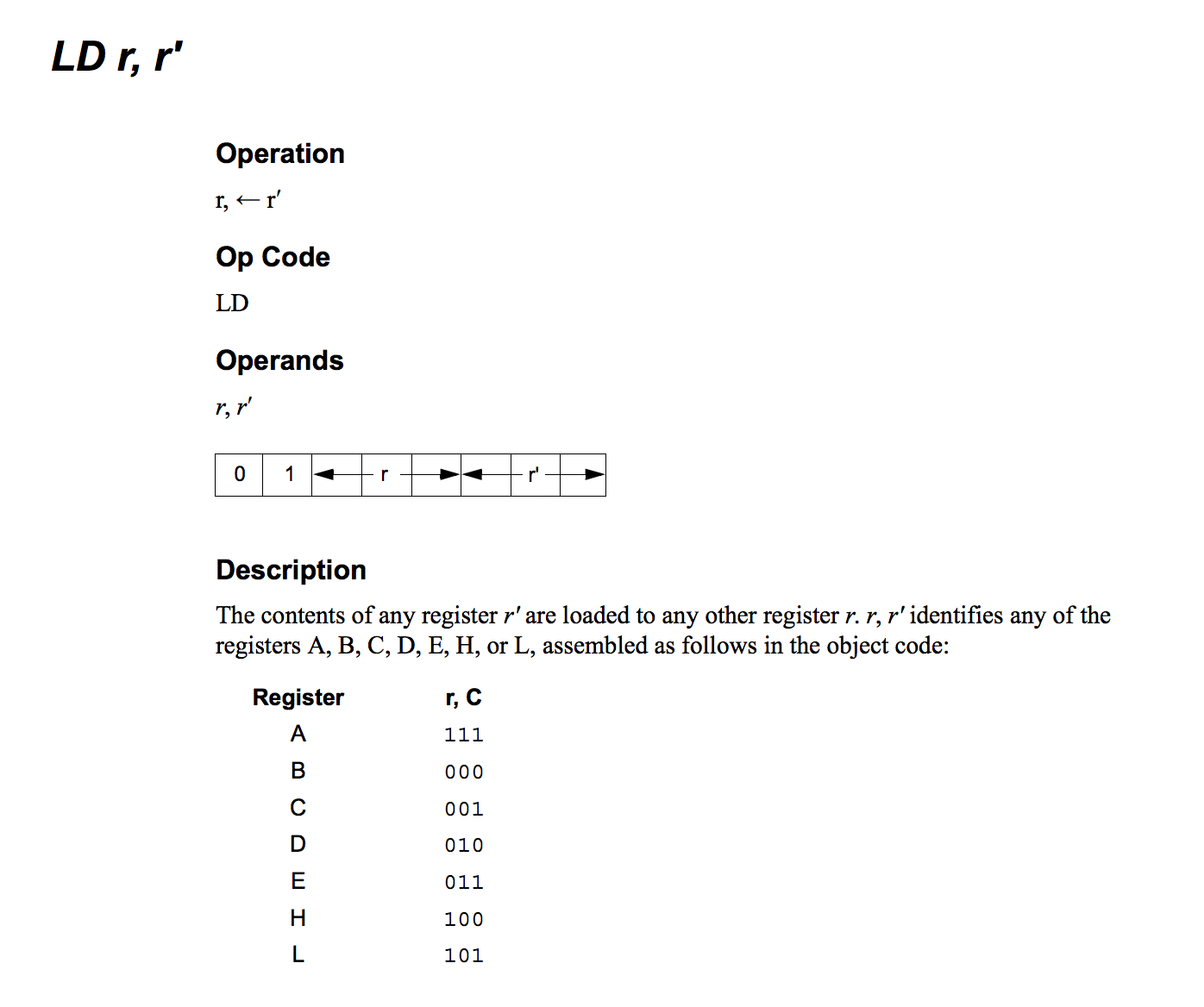- D52 is the same disassembler that is used by our Micro C 8051 Development System for disassembling of standalone hex files. Download d52v336.zip ( Version 3.3.6 Jan 2005, 222KB ) D52 Manual. The package also contains disassemblers for 8035, 8041, 8048 and Z80.
- Z80 standalone assembler (Full IDE at ASM80 Online Assembler). Intel 8080 - Intel 8008 - Zilog Z80 - MOS 6502 - WDC 65816 - Motorola 6800 - Motorola 6809 - CDP1802.
MZT or My Z80 Tools is a complete set of cross-assembly tools targeted at the Z80 cpu in a Linux enviroment. It includes a macro assembler (mzmac), a linker/librarian (mld80) and a disassembler (mdz80). All the software si derived by a fork of existing projects. See in the sections relative to each tool for original authors credits. MZT needs cmake to compile. Cmake is available on all major Linux distributions and you can always visit project site www.cmake.org for additional informations. Why MZT? If you are of those in a hurry, you can jump directly to the downloads, or you can read more in each tool's section: mzmac, mld80, mdz80. Installation Install cmake, if you do not already have it on your system. Extract MZT tar file in a working subdirectory and then do: By default MZT will be installed in /usr/local, if this is not what you want, in MZT top directory you can edit the Makefile and change the value of the variable INSTALL_PREFIX to your desired installation path. Depending on where you decide to install MZT executables, you may need root permissions to do 'make install'. Mzmac is a macro cross-assembler for the Z80 and is based onthe well-known zmac of which it inherits all the features. In particular mzmac is based onthe highly advanced version of zmac developed by George Phillips that includes, among other features, cycle counting and various output formats including the most important '.rel'. Mzmac differs from its predecessor in management of output formats, the format of listing and in management of options from command line. It also has a better support for 64-bit environments, reformatted source code and some minor improvements/bug fixing. Mzmac exactly as zmac has a long list of credits: Bruce Norskog wrote the original version in 1978 and then it was updated by John Providenza, Colin Kelley, Russell Marks, Mark Rison, Chris Smith, Matthew Phillips and Tim Mann. Finally George Phillips has written the versions on which mzmac is based. Usage: It has the following options: Using --help or --html, produce a much more informative help page, respectively in (coloured) text or in HTML format that you can also read here. Apart its ability to produce .rel format output, mzmac can perform accurate timing evaluation (cycle counting) on assembled code. George Phillips has written an interesting tutorial on this at his site. Known bugs: Equates of this kind: are not always evaluated correctly. Replace with this to be sure: Mld80 is the linker/librarian tool of MZT toolset. While it is a replacement for the Micrososft L80 linker for CP/M and incorporates almost all of its capabilities, mld80 has also extra features. Mld80 accepts object (.rel) files produced by mzmac or by original m80, rmac or compatible assemblers as well as library (.rel) files made by LIB80. In this initial release it does not support any of expected librarian function (create or add/change/remove members). It is also not capable to produces .SPR, .PRL or .OVL files. All this features will be in the next release. Mld80 is a derivative of ld80 by Gábor Kiss. Usage: Addresses must be in the range 0-FFFF and expressed in hexadecimal notation. Addresses prefixed by a percent (%), as %NNNN, are not absolute and instructs mld80 to place following segments on a NNNN-boundary. E.g. -D%10 causes the following data segments to be located on a 16 byte boundary. -Paddress specify the address where code segment of the following object files will be placed. If an object file specification is not preceded by -P option, code segment will be appended to the previous one. If no -P option specified before the first object file, its code segment will be placed to 0000. -Daddress specify where data segment of the following object files will be placed. If an object file specification is not preceded by -D option, data segment will be appended to the previous one. If no -D option specified before the first object file, its data segment will be appended after the last code segment. -Cname,address address is the address where common block name will be placed. If block name name is empty string or it begins with space it will be treated as blank common block. However no extra whitespace character around of comma (,) are allowed. Name is not case sensitive. Common blocks of unspecified location will be appended to the last data segment. -Uname Common block named name will be 'uncommon'. Normally common blocks of the same name are located on the same address. However blocks marked as uncommon will be concatenated like code or data segments. In this way you can spread your code/data over several region of physical memory. Name is case insensitive. -llibrary The following object file is a library. Mld80 will scan the library loading only modules that satisfies unresolved external references. If a new reference is encoutered to an already extracted module than the newer module will not loaded again. It is possible to specify the same library more than once in order to resolve backward references. -c Suppress data segments. The output file will contain just code and absolute segments only. -Ooformat Output format specification. Possible values of oformat are:
-Wwarns Request for warning messages. Possible value of warns is (only): extchain: Warn if ambigous external reference found. -ssymfile Name of symbol file. `-' stands for the standard output. -m Generate map. A list of segment mapping will be placed into symbol file if it has been specified. Otherwise the segment list will printed on standard output. -Ssymsize Symbol table size. Use this option if the linker have to process more than 1024 symbols. -V Print version number and exit. Mdz80 is a 'smart' disassembler for the Z80 cpu. It has the abilty to trace input code to 'guess' what kind of binary data it is, and so, to have a disassembly that correctly produce different output for data or code. Disassembly is also controlled by a 'control' file (autogenerated the first time) that lets you assign a 'type' to variuous regions of code to produce highly readable code even from the first attempts of disassembly job. Of the MZT toolset mdz80 is the most mature and heavily rewritten respect to original code. Mdz80 is a fork of the D52 microcontroller disassembler from Jeffery L. Post. The mdz80 disassembler allows the user to specify memory areas as code, binary data (8 or 16 bit), ascii text, address tables, or data that should be ignored (not disassembled). You may specify such areas in an ascii text file with the same name as the file to be disassembled, but with an extension of ctl (for example: program.ctl controls the disassembly of program.hex or program.bin). Usage:
A control file with the same name as the file to be disassembled, but with an extension of '.ctl' can be created in which you can specify areas of memory to be ascii text, 8-bit binary data, 16-bit binary data, etc. A control file is not necessary for disassembly, but as will be seen, it will provide for a much more complete disassembly. The -t option will cause mdz80 to trace and analyze the code before disassembly, and will create a preliminary control file.
If a file extension of '.hex' or '.bin' is provided in the filename (ie: mdz80 test.hex), that is equivalent to using the -h option or -b option.
This makes it easy to spot areas of ascii text or other nonexecutable code, and you can then modify the control file to tell the disassembler that these areas should be treated as some other kind of data on subsequent disassemblies.
or
-a (ascii macro)The A option tells the disassembler to change the db/defb pseudo op to the ascii macro (pseudo op 'ascii' instead of 'db' or 'defb') for areas defined as ascii text. This will cause the disassembler to include a macro definition in the disassembly output file that should expand to 'db' for the cross assembler. To use this option, your cross assembler must be able to handle macros, and in particular, mzmac's macro format. If used in conjunction with the -s option , the -s option must come first on the command line. -8 (disassemble 8080 code)Disassembles code using 8080 opcodes instead of Z80 opcodes (that is the default). -b (read binary file)The -b option forces the disassembler to read a binary file (extention '.bin') instead of an Intel hex file (extention .hex). If neither the -b option nor the -h option are specified, the disassembler will first search for a file with an extention of .hex, and if not found, will then search for a binary file with an extention of .bin. -c (control filename)This option lets you specify a filename for the .ctl file to be used, instead of the default that is input filename postfixed with '.ctl'. -C (disassemble CP/M .com file)Disassembles a CP/M .com executable file beginning at address 100H. Use of this option will cause mdz80 to look for a file with a .com extension, as opposed to a .bin or .hex extension. This option also sets the offset to 100H without the need to do so with the -x option. -d (put data in comment field)The -d option tells the disassembler to include a comment field in each disassembled line. The comment field will contain the hexadecimal address of each instruction, the hex data for each byte in the instruction, and the ascii code for each byte of the instruction.
This makes it easy to spot areas of ascii text or other nonexecutable code, and then modify the control file to tell the disassembler that these areas should be treated as some other kind of data on subsequent disassemblies. -e (evaluate symbols from asm source)Use this option to feed mdz80 with an assembler source file the contains valid labels, equates and entry points in the context of what you are disassembling. In this way mdz80 will extract a list of symbols to be used in the current disassembly substituting symbols in list with the autogenerated ones. -f (use '$' prefixed operands)Use this option to have the disassembler output hexadecimal operands using '$' prefix notation, ie: $cd instead of the default 0cdh. -h (read hexadecimal file)The -h option forces the disassembler to read an Intel hex file (extention '.hex') instead of a binary file (extention '.bin'). If neither the -b option nor the -h option are specified, the disassembler will first search for a file with an extention of '.hex', and if not found, will then search for a binary file with an extention of '.bin'. -l (lowercase case output)Causes labels, symbols, mnemonics, etc to be output in lower case, for cross assemblers that may require lower case code. Comments, literal data values, strings, and other output are not affected by this option. -n (use C type operands)Use this option to have the disassembler output hexadecimal operands using C notation, ie: 0xcd instead of the default 0cdh. -o (output filename)This option lets you specify the output filename, instead of the default that is input filename postfixed with '.z80'. -p (add dot in front of pseudo ops)Some assemblers require pseudo operations to begin with a dot. Use this option to have the disassembler output '.equ' instead of 'equ' and similar for org and other pseudo operations. -s (set string pseudo op)This option tells the disassembler to generate the pseudo ops 'db' and 'dw' instead of 'defb' and 'defw' for those cross assemblers that may require this.Use this option for cross assemblers that do not recognize 'defb' and 'defw'. If used in conjunction with the -a option , the -s option must preceed the -a option on the command line. -t (trace and analyze code)This option tells mdz80 to trace and analyze the Z80 code before disassembling it. mdz80 will attempt to determine which parts of the code are actually code, and which parts are ascii text, binary data, pointers, etc. While it does a reasonably good job of analyzing the code on most files, no program can do as good a job as a human programmer. A control file with the same name as the hex or bin file, but with an extension of '.ctl', will be created before the actual disassembly is performed. You can then edit the control file to correct any erroneous directives, or to add new directives. -T (presume code during trace)This option is meaningful only in conjunction with -t option during initial traces of the code. If you are disassembling very fragmented code or code that cannot clearly traced from the beginning (i.e. a library) this can easily confuse mdz80 produncing wrong output. -T option will instruct mdz80 to presume the all binary input that can't be exactly identified as code or data must be considered as code and in this way disassembled. -v (be verbose)Will inform you of the phases of disassembling. -V (print version)Will print mdz80 version and then exit. -x (add hexadecimal offset to addresses)This option causes the disassembler to add a hexadecimal offset to the address of every location in the code file. This may be useful for disassembling code that was read from the second (or subsequent) rom of a set of roms. For example, suppose that binary data was obtained from a set of 4K byte eproms (call them rom1 and rom2). Then the first file should be disassembled with the command line:
and the second should be disassembled with the -x option:
The two files then can be combined into one and all references within the disassembled code will be to the correct addresses. The control file
See here how to use the control file.
Suggestions or, even better, code enhancements are more then welcome... |

Making 8-Bit Arcade Games in C. With this book, you'll learn all about the hardware of Golden Age 8-bit arcade games produced in the late 1970s to early 1980s. We'll learn how to use the C programming language to write code for the Z80 CPU. The following arcade platforms are covered:. Midway 8080 (Space Invaders). VIC Dual (Carnival. Download Interactive Disassembler Z80 for free. An interactive disassembler for Z80 processors.
Latest version (source format): mzt-1.0.0.tar.gz | Older versions: - none - |

Z80 Disassembler Source Code


